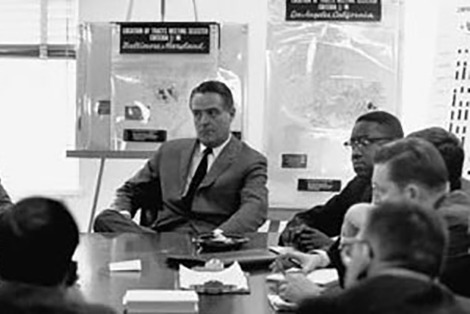The Shriver Center on Poverty Law fights for economic and racial justice. Over our 50-year history, we have secured hundreds of victories with and for people living in poverty in Illinois and across the country. Today, we litigate, shape policy, and train and convene multi-state networks of lawyers, community leaders, and activists nationwide. Together, we are building a future where all people have equal dignity, respect, and power under the law.

As an attorney, our founder, Sargent Shriver understood the role of the law and of lawyers in accomplishing the goal of equal justice and opportunity for low-income communities. Sarge had a vision of recruiting and supporting sufficient numbers of legal services attorneys to provide reasonable access to an attorney for all low-income people in the country. He also thought that these attorneys should be linked together so that, to the extent possible, they would function as a national law firm for the poor (as opposed to isolated attorneys in scattered storefronts in low-income neighborhoods). The glue for this national law firm was the National Clearinghouse for Legal Services, which published Clearinghouse Review, containing action research for lawyers, and maintained a brief bank with hundreds of thousands of poverty law documents that the attorneys could tap for ideas and models, mutual learning and strategizing.
In 2003, Shriver gave his name and personal authority to a new project, the Shriver Center on Poverty Law, formerly the National Clearinghouse for Legal Services. It is dedicated to the practice and perpetuation of Sarge’s values-driven methods for bringing the law to bear on community-generated issues involving equal opportunity and social justice. Today, the Shriver Center continues to support and enable the work of other advocates, and engages directly in policy and systemic advocacy on behalf of low-income people and communities across the country.
The Shriver Center on Poverty Law provides national leadership in advancing laws and policies that secure justice to improve the lives and opportunities of people living in poverty.
Our vision is a nation free from poverty with justice, equality, and opportunity for all.
We believe in organizational excellence at all levels, grounded in these core values and measured against progress toward our mission to guide our path to success. We hold ourselves accountable to individuals experiencing poverty and injustice, our partners, and our colleagues to carry out our work consistently with these values:
Centered on People and Communities
We work with and for the people we serve. We help communities win law, policy, and systemic changes to promote equity and pathways out of poverty.
Justice for All
We pursue justice for all by providing high quality legal representation and advocacy to people in poverty regarding the laws, public policies, and systems that constrain and diminish—but also improve and support—their lives and opportunities. We believe justice for all is significantly advanced when people in poverty help shape the laws and policies that govern their lives and have strong opportunities for upward mobility.
Equity, Diversity, and Inclusion
We forcefully address the most salient feature of poverty in America—race. Advancing racial equity is essential to promoting justice. We also recognize that inclusion of diverse voices, perspectives and experiences is essential to understanding and addressing complex issues in our advocacy and within our organization.
Accountable Leadership
We recognize our role as a trusted organization. We take it as our responsibility to listen to the communities we serve, be accountable to them, be a good steward, and deploy our full advocacy toolbox toward accomplishment of our mission. We commit to develop a pipeline of new leaders equipped to continue the work successfully.